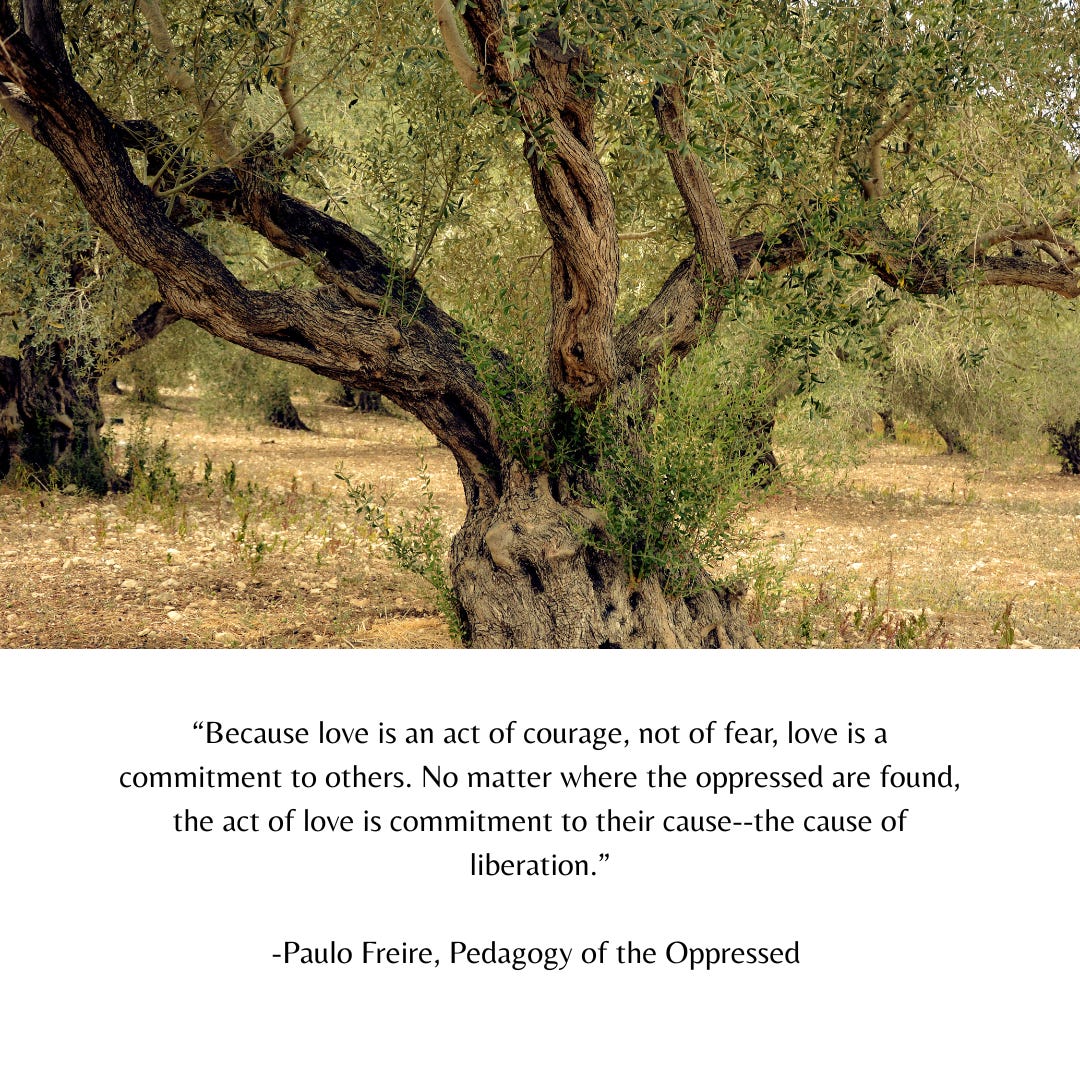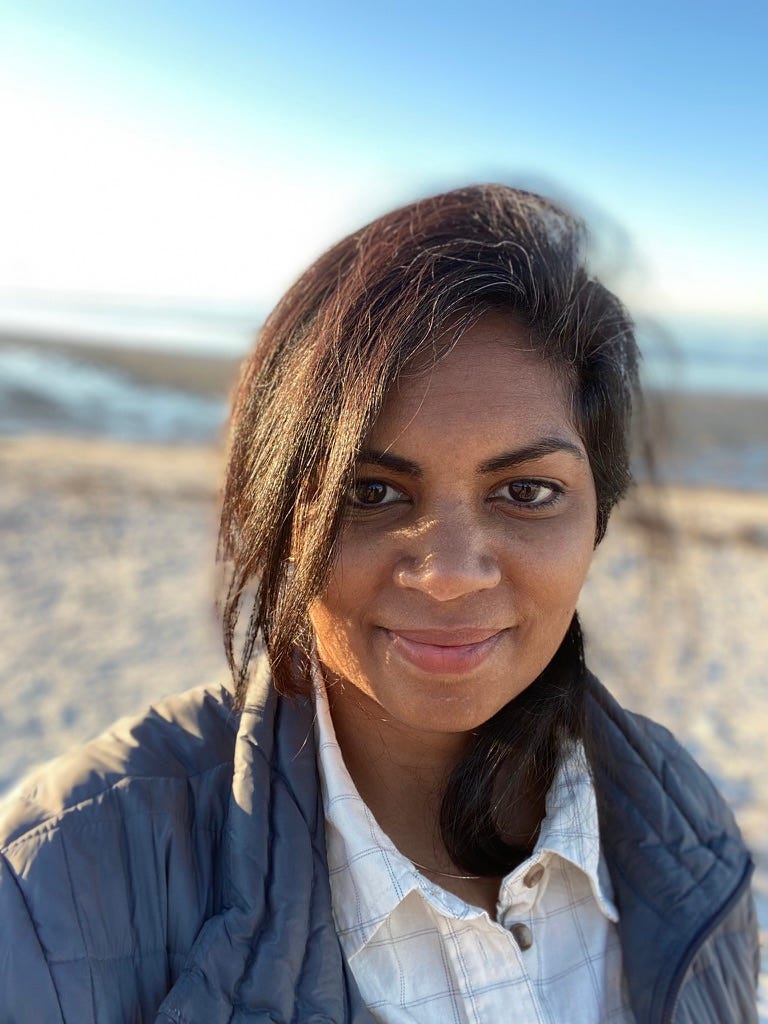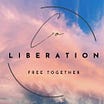A few weeks ago, I was hanging out with my dear friend Ida and we were discussing a common topic: our alienation from former friends and family and our disgust/sadness over the fact that those we loved fiercely at one time, those we trusted with our hearts and minds, didn’t care about the most publicly violent act occurring on the planet: the genocide of Palestinians.
In short: many of those we love/loved appear to lack a soul.
How, I asked Ida, does one make sense of this?
She explained how pain is a guide, if we allow it to be. That pain leads us to our true selves and each other, if we follow it. But most of us refuse to tolerate pain, hence the looking away, can’t read about/watch/hear about xyz. Most of us refuse to even grieve – really grieve - the death of our mothers, fathers, even children, choosing instead to “focus on the positive,” “be strong and move on,” or a version thereof. Thank you, Ida, for directing us to the greatest teacher of all, our pain. – Saira Rao
We are immersed in several layers of grief. First and foremost, the grief over the brutal torture, murder, and horrific atrocities experienced by the Palestinian people. We continue to bear witness and have not turned away or tuned out. Watching the live-streamed torture and deaths of beloved mothers, fathers, sons, daughters, siblings, spouses, grandparents, and infants over the last 19 months has wrecked me. I find it nearly impossible to sleep – and often, the sleep I do find is the result of turning this way and that, staring at my children and wondering how mothers across the sea live. This is a grief I choose to hold and engage. Over time, I have learned how to distinguish it from despair, which paralyzes and steals our dreams, will and choice. As a society, we must learn to swim in a sea of grief and not be overtaken by the currents of despair.
The next layer of grief I have wrestled with has to do with the world and my perception of it. I grew up thinking that if we worked hard enough, if we fought hard enough, we would have our freedom, our lives, our joys. I believed that if we knew about an injustice, we would work to change it. I grew up in the U.S., so I know racism and its impacts personally. I have experienced systemic injustice as well as the interpersonal degradation of a racialized existence. I believed that ignorance was at the core of our inaction. But now I see that even with all the information - a genocide livestreamed to us on our personal devices – we *still* choose every day to live largely unaffected lives, participating in the very thing we claim to despise.
The grief I have been working through is the loss of relationships. I no longer feel comfortable with family and friends when Palestinian suffering is not a shared red line. People with whom I have fought alongside for racial, economic, ecological, reproductive, and self-sovereignty justice have been silent about genocide. I include myself, as we all must, as an imperfect human in the process of aligning my values with my actions. None of us living here as settlers on occupied Indigenous land, in the most privileged country with the largest military presence and economic impact globally, are exempt from responsibility. We all actively participate in genocide. We also all have the choice to divest in the many various ways we can (or more accurately, must). This conversation about divestment has been the source of the shedding of relationships. I have lost lifelong friends who have chosen at one point or another to lean away, look away, and tune out when invited to rise to the occasion and align their actions with their words. As the leaves that once helped me grow fall away, I dig my roots deeper, growing towards my convictions.
What makes us stay in the game as the stakes rise? What makes us lean in when we are watching people we may have even admired for their bold stance on equity, shy away when multiple genocides are allowed to continue.
What has driven us towards this growth, this commitment to alignment with our values, towards divestment from things like jobs, hobbies, schools, activities, how we spend our time, perhaps most of all relationships that “comfort” us into numbness and inaction rather than challenge us to continue down the rocky path of practicing ourselves what we preach to others?
Embracing our personal experiences of pain is the salve. Pain signals that something is wrong with our bodies, that we are sick, and we need to slow down, change something about our lives, and heal. If we ignore this warning system in ourselves long enough, instead of facing the pain, working through the pain, and allowing it to teach us about what is at the root of it, we are simply managing symptoms via painkillers or numbing agents. We are not letting it be the transformative agent that it can be. Suppose we avoid our personal experiences of pain (loss of someone you love, loss of love, erasure of self, injustice, betrayal, abuse, violence, etc.). Instead of metabolizing it and transforming it into creative energy, it becomes metastasized into a cancer that is transferred to others. We inevitably become the harm if we do not choose to become the healing.
In our conversation, Saira shared how the loss of her mother was core to her transformation. She chose to grieve, to face it, to work through it, and found her resolve, her substance, her values through that process. This continues to inform her sense of capacity to hold and be transformed by her pain.
I can recount the ways I have experienced pain in my life. From racism and erasure to economic hardship and loss of loved ones. I have had to face the pain and fears resulting from these experiences. I know the pain of being colonized, and of watching my people choose a colonial mentality. Diving into my pain allows me to learn to hold pain compassionately and become a person who can hold the pain of others. I began to hear - and feel - the stories of my family’s pain, of their experiences of massacre and violence during the British occupation.
How could I now look away from the genocide in Palestine? I hold in my blood the cost of resistance and in my existence the hope of the remnant. I am the living liberation legacy, survival, and collective resistance of my people. This calls me into responsiveness and responsibility. I can no longer separate myself from those currently under occupation. I see myself as interconnected to those experiencing today’s occupying forces: both my countries, the U.S and India. I am part of creating the very pain my family survived.
This keeps me up. On every face in Gaza, Congo, Sudan, and Kashmir, I see my grandparents, I see my children, I see my loved ones, and I know without a shadow of a doubt that everything in me is revolted by this incongruence in my life. Every metabolized experience of personal and collective pain is activated into energy, working on ways to divest, challenge, resist, and create.
Our collective pain manifests as chronic depression, paralyzing anxiety, and unrelenting waves of grief; this is good. It is a sign that we are connected to our co-beings on earth, to our plant and animal siblings, to our human counterparts across the globe. Pain is our tether to one another. Befriend this pain, learn from it as if it were a wise teacher, let it form your understanding and values. Let it be the transforming agent that it is meant to be. Allow it to develop into intuitive connectivity with the rest of the world: empathy. Let it break the calcification of our souls, so we develop the ability to rise to the occasion and resist, and ever more boldly dream and create. We cannot reframe our thoughts into believing in a just and fair world with no praxis to uphold it. The incongruence between our ideals and our actions reveals to us the pain we refuse to work through and therefore inevitably replicate.
Building muscle requires many hundreds of microtears. Increasing empathy requires us to experience pain fully. Allow the witnessing of Palestine to keep you up at night. Let it rend your hearts. Stay awake and let the problem of a stolen world consume your mind and ruminate. Allow it to seep into every conversation so you can collaborate and metabolize this pain, allowing it to transmute into empathy, compassion, moral integrity, internal power, and community. Sit with the grief of our role on this planet until it becomes unwavering love and healing. Don’t let yourself increase your daily functioning by numbing into participation in a world order that has always prioritized greed over the sacred living.
This alignment will cost us the shedding of old selves, governed by comfort and greed. If we are to transform into ones with substance and integrity, to reclaim the sacred, beloved relationship we have with ourselves and each other and this generous earth, we must face our personal and collective pain.
Pain is the gift that returns us to wholeness and to one another. It has cracked me open, and I am learning to be free. Join me.
Ida Braford lives with her partner, two children, and two pups. She has an M.A. in Cultural Anthropology and an M.A. in Counseling Psychology. Ida works as a Resident in Counseling and offers holistic health and relationship coaching. Ida is a healer and seer who loves to spend her time playing with her kiddos and pups, listening to music, and working on creative projects.












Beautiful words from Ida ❤️
Thank you, this is what I needed to read today, especially love the distinction of grief and despair as “we must learn to swim in a sea of grief and not be overtaken by the currents of despair.” 😩❤️🔥🫂 These layers of grief have been so difficult to process and also I believe it has helped us to put a name to what we sensed or felt in those relationships long before the genocide, and that identification has been a relief as well, a bitter relief but a liberating one. Thank you both Saira and Ida for sharing this 🙏🏼